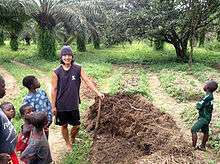WWOOF


World Wide Opportunities on Organic Farms (WWOOF, /ˈwʊf/), or Willing Workers on Organic Farms, is a hospitality service operated by a loose network of national organizations that facilitate homestays on organic farms. Australia with 2,600 hosts has the most host farms and enterprises, followed by New Zealand with 2,340 and United States with 2,052 hosts.[1] The UK has 688 WWOOF hosts.[1] While there are WWOOF hosts in 99 countries around the world, no central list or organization encompasses all WWOOF hosts. As there is no single international WWOOF membership, all recognised WWOOF country organizations strive to maintain similar standards, and work together to promote the aims of WWOOF.[2]
WWOOF aims to provide volunteers (often called "WWOOFers" or "woofers", /ˈwʊfər/) with first-hand experience in organic and ecologically sound growing methods, to help the organic movement; and to let volunteers experience life in a rural setting or a different country. WWOOF volunteers generally do not receive money in exchange for services. The host provides food, lodging, and opportunities to learn, in exchange for assistance with farming or gardening activities.
The duration of the visit can range from a few days to years. Workdays average five to six hours, and participants interact with WWOOFers from other countries.[3] WWOOF farms include private gardens through smallholdings, allotments, and commercial farms. Farms become WWOOF hosts by enlisting with their national organization. In countries with no WWOOF organization, farms enlist with WWOOF Independents:[4]
Examples of WWOOF experiences include harvesting cup gum honey from Ligurian bees at Island Beehive in Kangaroo Island, harvesting Syrah grapes for Knappstein Vineyard in the Clare Valley, and harvesting coffee beans from coffea arabicas in Northern Thailand.[5][6]
History
WWOOF originally stood for "Working Weekends On Organic Farms" and began in England in 1971.[7] Sue Coppard, a woman working as a secretary in London, wanted to provide urban dwellers with access to the countryside, while supporting the organic movement. Her idea started with trial working weekends for four people at the biodynamic farm at Emerson College[8] in Sussex.
People soon started volunteering for longer periods than just weekends, so the name was changed to Willing Workers On Organic Farms, but then the word "work" caused problems with some countries' labour laws and immigration authorities, who tended to confuse WWOOFers with migrant workers and oppose foreigners competing for local jobs.[7] Both to eliminate that problem and also in recognition of WWOOFing's worldwide scope, the name was changed again in 2000 to World Wide Opportunities on Organic Farms. Some WWOOF groups (such as Australia) choose to retain the older name, however.
How it works
Volunteering
Volunteers must first choose what country they would like to visit and volunteer in. They can sign up for their desired country on the WWOOF website. After signing up volunteers will receive a list of farms located in their country of choice. From this point it is up to the volunteer to contact their desired farms and arrange the dates and duration of their stay. The duration of a volunteer's stay can range from days to months, but is typically one to two weeks. Volunteers can expect to work for 4–6 hours a day for a full day's food and accommodation. A volunteer could be asked to help with a variety of tasks, including: sowing seed, making compost, gardening, planting, cutting wood, weeding, harvesting, packing, milking, feeding, fencing, making mud-bricks, wine making, cheese making and bread baking. WWOOF promotes participation as a way to experience first hand a local culture, customs, and nature through farming.[9][10]
Host locations
As of 2016, 61 countries have a national WWOOF organization.[11] 8 of these are located in Africa, 12 in North and South America, 13 in Asia-Pacific, 26 in Europe and 2 in the Middle East. WWOOF Independents list hosts located in 53 other countries.
See also
References
- 1 2 Paull, John (2016) Organics Olympiad 2016: Global Indices of Leadership in Organic Agriculture, Journal of Social and Development Sciences. 7(2):79-87
- ↑ WWOOF - Around the World
- ↑ Smithers, Rebecca (22 April 2011). "Want to be a wwoofer?". The Guardian.
- ↑ Madden, Jacob (June 16, 2010). "WWOOF your way around the world!". CNN.
- ↑ Gordon, Maggie (December 17, 2015). "Do you have what it takes to WWOOF?". Houston Chronicle.
- ↑ DiLoreti, Jason and Jill (11 March 2014). "How to volunteer on a farm as a family: expert's guide to Wwoofing with kids". The Guardian.
- 1 2 WWOOF International: History of WWOOF
- ↑ "Good lives: Sue Coppard". The Guardian. 7 March 2006.
- ↑ Finz, Stacy (November 15, 2013). "WWOOF volunteers pitch in on organic farms". San Francisco Chronicle.
- ↑ ZAYED, MICHELLE (July 3, 2012). "WWOOF volunteers help Colorado organic farms while learning the trade". Denver Post.
- ↑ National WWOOF Organizations
External links
- WWOOF - The Federation of WWOOF Organisations (FOWO)